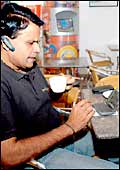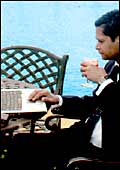|
On
the last Saturday of May this year, Rameshkumar Visvanath was
with his family at Hyderabad's Shoppers' Stop, when he received
an urgent message relating to a Fortune 100 client. The 42-year-old
Vice President (Finance) at Satyam Computer Services headed for
the Wi-Fi-enabled Barista outlet on the ground floor of the store
and sent out an e-mail from his Imate Jasjar 3g smartphone giving
that crucial final nod from his department. "These Wi-Fi
hot spots are really a boon as they allow me to remain connected
all the time and help maintain work-life balance," he says,
adding that he spends at least an hour every week at a hot spot
and much more when travelling (which is at least seven to eight
days every month).
It's a phenomenon that's taking root across
the country. And as many more people take to computing on the
go, hotel, restaurant and retail chains are increasingly offering
both paid and free Wi-Fi access as a value-added service to clients.
Says Naresh Malhotra, CEO, Café Coffee Day: "We noticed
many customers taking coffee breaks with their laptops and handhelds
and felt wireless internet access would be a useful value-add
to their experience." The chain is rolling out Wi-Fi infrastructure
at all its outlets, and the process of wiring all its stores across
50 cities is expected to be completed soon. Adds Rajeev Agarwal,
CEO, Innoviti, a Bangalore-based telecom solutions vendor: "It's
nice to get out of the office and do some work in the comfort
of a restaurant over a steaming cup of coffee." The McDonald's
restaurant in Mumbai's Phoenix Mills also recently became a Wi-Fi
hot spot. Says Mitesh Kadam, Assistant Manager, McDonald's: "On
average, we get two users per day."
 |
 |
"These Wi-Fi hot
spots allow me to remain connected all the time and help maintain
work-life balance"
Rameshkumar Visvanath/ VP (Finance)/
Satyam Computer Services |
"Wi-Fi frees
you from the constraints of browsing the
web from your desktop or an internet cafe"
Hari Sukumar
Freelance model |
Hotel Krishna Palace Residency, on Mumbai's
Grant Road, has three wireless zones-its 2,500 sq. ft reception
area and at The Flute and Sudama, its two restaurants. "Our
bookings have risen almost 5 per cent since we started offering
this service," says Saurabh Shetty, a Director of the hotel.
Adds Karan Sachdeva, a guest at the hotel: "Without question,
this is an excellent concept as it helps me to keep working from
wherever I am." The main draw, obviously, is that Wi-Fi makes
work location-neutral. "The best part is that my 'mobile
office' allows me to mix pleasure and pressure," says Satyam's
Visvanath. He should know, considering that his day typically
begins at 6.30 a.m. and concludes (unless he decides not to switch
off) at around 11 p.m.
Several of these chains offer Wi-Fi access
free, though some others do levy charges that range from the nominal
to the very expensive. Café Coffee Day, for instance, charges
Rs 30 for half-an-hour; Chennai's Hotel Trident, on the other
hand, charges Rs 340 for a two-hour package. Some Trident guests
reportedly walk across to the neighbouring Hotel Radisson GRT,
which offers this service free, to surf the internet. "We
don't mind as we feel these people could well become our customers
in future," says Vikram Cotah, General Manager of the hotel.
The Oberoi Group, which runs Hotel Trident, did not respond to
an e-mailed questionnaire. Other hotels, though, don't like publicising
this service as "we don't want to become internet hubs; we
only want to offer the service to our guests", according
to B.V.S. Reddy, President of the Chennai-based Hotel Savera.
| THESE PLACES ARE WI-FI ENABLED |
MUMBAI
» Barista Coffee
(Sion Trombay Rd)
» Café
Coffee Day (New Queens Rd)
» McDonald's (Phoenix
Mills)
» Mumbai Airport
» ITC Grand Maratha
Sheraton
DELHI
» India
Habitat Centre
» MarketCafe,
Khan Market
» Café
Coffee Day, Malviya Nagar
» Hotel Le Meridien
» Oxford Book
Store, Statesman House
CHENNAI
» Hotel
Savera
» Hotel Radisson
GRT
» Hotel Trident
» Chennai Trade
Centre
» Chennai Airport
BANGALORE
» Vidhana
Soudha
» International
Tech Park
» Hotel Royal
Orchid
» Hotel Taj
West End
» IIM
KOLKATA
» Barista,
AJC Bose Road
» Seven Heaven,
Victoria Terrace
» Hotel Taj
Bengal
» Hotel ITC
Sonar Bangla and Tower
» Cy-Fi, CIT
Road
HYDERABAD
» Café
Coffee Day, Secunderabad
» Café
Coffee Day, Jubilee Hills
» Some parts
of Hyderabad airport
» ITC Kakatiya
Sheraton & Towers
» The three
Taj Group Hotels
This is not an exhaustive list
|
A majority of users say they use Wi-Fi only
for work. Neha Sharma, a sales engineer at it consulting firm
utStarcom India, sometimes uses the Wi-Fi-enabled zones at Delhi's
India Habitat Centre (IHC) to access the internet on her laptop.
"In today's environment, you have to be mobile; so working
out of a hot spot is often a necessity," she says, adding:
"I only use it for work and most of my colleagues also use
Wi-Fi for work-related purposes only." Wi-Fi also played
an important role in MBA placements. "We had a great placement
season this year and having wireless internet helped us organise
infrastructure better for recruiters and the media," says
Madhurjaya Banerjee, an iim Bangalore student and a member of
the institute's student media cell.
But there is, nonetheless, a sizeable section
of people who visit Wi-Fi hot spots to chat with friends, download
music or send CVs to potential recruiters. "It's fun to sit
outside the office and play some music or just chat with friends
on the internet. Sometimes, I also update my music collection
from one of these places," says Abhisehek Dhingra, a business
analyst at Wipro.
Another attraction of Wi-Fi hot spots is
the facility they offer of making international long distance
calls using Skype. It's absolutely free. Admits Sharma: "I've
used it once or twice to make calls using VOIP."
It's also a huge enabler in education. The
IIMs and the IITs, of course, are all Wi-Fi enabled and have been
for a while. Now, even relatively lesser known institutes, such
as the Welingkar Institute of Management Development & Research
(WIMDR), Mumbai, are jumping onto the bandwagon. "Since students
are floating around outside of regular class timings, Wi-Fi enables
them to receive messages from professors and coordinators instantly
and also access teaching material put up online," says Pradeep
Pendse, Senior Associate Dean (Systems & E-Business) at the
institute. Adds Chetan Sabharwal, a second-year student at WIMDR:
"We have Yahoo groups for the entire class and all the students
can get mails at the same time. This is very convenient and keeps
us all connected."
| PUNE TO BE INDIA'S FIRST WI-FI CITY |
| Pune is expected
to join a select group of cities in the world which have a
citywide Wi-Fi umbrella and will be the first Indian city
to do this.
Anand Deshpande, CEO, Persistent Systems, one of Pune's
larger IT firms, and a member of the committee advising
the Pune Municipality on the implementation of the Wi-Fi
network, says: "Pune is a growing city, and it has
growing needs in IT. A Wi-Fi network will allow our citizens
to access the net anytime, anywhere." However, Deshpande
admits that the commercial aspects of the plan have not
been finalised yet. "I don't believe the network will
be free, but we have not yet worked out the access and fee-related
issues." he says.
But with access over next-generation mobile networks guaranteeing
faster speeds than over 802.11 (the Wi-Fi access norm),
a citywide Wi-Fi network may be rendered redundant (unless
priced cheaper than mobile networks). However, laptop users
across the city aren't exactly complaining about the prospect
of being spoilt for choice.
-Kushan Mitra
|
Most users, however, have a major grouse.
Says utStarcom's Sharma: "Wi-Fi is not always reliable and
readily available in India. So, many people I know move around
with internet access cards." Kanwar Digvijay Singh, a software
engineer at Tulip it Services, a software consultancy firm and
a regular at IHC, concurs. "It's so much easier to surf at
a Wi-Fi hot spot in the developed world. Here, you just don't
have the kind of speeds that you have there," he says, adding:
"The Wi-Fi culture will really take off in India only when
there are greater numbers of hot spots and much higher speeds."
Security of data is another issue. But these are still relatively
early days for Wi-Fi in India. Just as the dial-up modem has been
replaced by universal broadband access, Wi-Fi will, almost certainly,
gain in popularity in the months to come.
-Reporting
by Rahul Sachitanand, E. Kumar Sharma, Ahona Ghosh, Nitya Varadarajan
& Aman Malik
|







